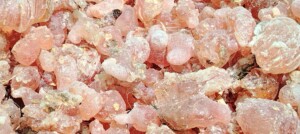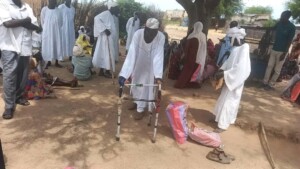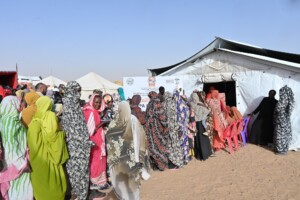Germany restricts Dutch export after providing army trucks to Sudan
The German Ministry of Economy is restricting companies to re-export German trucks without prior approval after a Dutch company exported German army trucks to Sudan in 2001 and 2012. The Khartoum government used the trucks in the civil war in the Nuba Mountains.
The German Ministry of Economy is restricting companies to re-export German trucks without prior approval after a Dutch company exported German army trucks to Sudan in 2011 and 2012. The Khartoum government used the trucks in the civil war in the Nuba Mountains.
The German ministry has notified the decision on Wednesday 23 June to a German parliamentarian of Die Linke, after the party received information based on investigations by Dutch radio programme, VPRO Buitenland. The German ministry writes that German army trucks will only be sold to foreign companies with an 'End-users declaration', that requires an explicit additional approval by the German government. Even if the company is allowed by its own government to export the army of German origin, the re-export of trucks needs from now onwards a German permission. Over the past few years Germany exported 3,662 army trucks to the Netherlands.
The German trucks were seized by rebels in South Kordofan between June 2011 and April 2012, together with significant quantities of small calibre ammunition, mortar bombs, anti-tank rockets, and shells, as well as weapons, including grenade launchers, mortars, canons, and T-55 tanks. Weapon experts of the Small Arms Survey counted tens of trucks captured from the Sudan Armed Forces (SAF) 14th division.
In its report ‘New war, old enemies: Conflict dynamics in South Kordofan’, the investigators describe how they found the German-manufactured MAN military trucks in May 2012. These trucks were shipped to Port Sudan from Antwerp in Belgium, on 26 June 2010 (4×4 type 461) and from Amsterdam, the Netherlands, on 27 October 2011 (6×6 KAT1 G1-type). The export was confirmed and approved by the Dutch authorities.
These vehicles were purchased from the Verwertungsgesellschaft des Bundes (VEBEG), a trust company of the German Ministry of Finance that manages disposal sales from the federal army. The Dutch-registered private company, Van Vliet Trucks Holland BV, exported and repainted the trucks. According to information from Van Vliet and the Dutch authorities, the special military features were removed.
The recipients of the trucks, a Sudanese company registered in Khartoum called ‘Concept Development Co.’, an unidentified company at the very same address of Giad Services and Investment Co., directly controlled by the GoS (Government of Sudan). GIAD factories are also manufacturing army trucks for the Sudan Armed Forces.
The exporting company did not apply for an export license for the trucks, saying "the vehicles are non-military goods", so "no export license is required".
After the trucks had arrived in Port Sudan, they were speedily deployed to South Kordofan to fight the rebels, but soon became in the rebels’ possession, according to the report. The exporting company Van Vliet, did not apply for an export license, arguing that ‘the vehicles are non-strategic (non-military) goods’ and that ‘no export license is required’, they explained to the researchers.
However, the German Federal Office of Economics and Export Control (BAFA) said the trucks were ‘specially designed for military use’ and ‘the transfer or export of these vehicles requires a licence, according to foreign trade regulations’, including after ‘repainting and removal of certain military features’. The Dutch authorities responsible for export control and strategic goods nevertheless considered that ‘no export license was required’ as ‘vehicles of these make and type are not classified as a ML6 item of the EU Common Military List’.
A Dutch Liberal Democrat (D66 Party) has questioned the Dutch approval: “If you are doing businesses with Sudan, you have to be sure who the end-user will be, in this case the Sudanese army. Their is a European embargo for Sudan. The country is led by president Bashir who is indicted by the International Criminal Court. For that you have to be extremely careful and we should not take any risks," he said before the VPRO radio.











 and then
and then